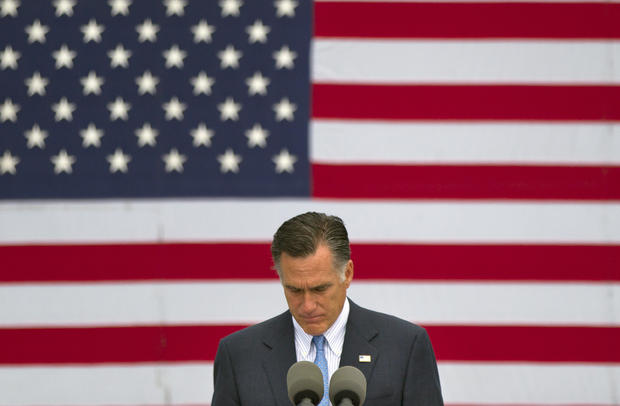Romney's foreign trip: Low key and light on policy
(CBS News) Four years ago, Sen. Barack Obama embarked on a heavily hyped trip abroad that took him through eight countries and two war zones -- and left no doubt about the heights to which his international renown had grown.
The grand tour was keynoted by a speech in Berlin in which the presumptive Democratic presidential nominee was welcomed with rock star-level adoration by what was likely the largest crowd of the entire 2008 campaign.
The American media gave far more attention to Obama's journey abroad than it typically devotes to similar excursions by sitting presidents, and the trip seemed designed as much to augment the aura surrounding the candidate as to bolster the foreign policy chops of a freshman senator running against a deeply experienced player on the international stage.
Obama's high-profile swing appeared at first to achieve its goals, but John McCain's campaign found a way to turn the spectacle on its head via a memorable ad titled "Celebrity." That 30-second spot juxtaposed footage from the Berlin speech with images of Paris Hilton and Britney Spears, underscoring the perception that there was little substance behind Obama's international acclaim.
As Mitt Romney prepares to embark on his own international swing this week, the Republican's campaign seems intent on avoiding even a hint of the pageantry surrounding Obama's trip four years ago, signaling that the presumptive nominee's version of a world tour will be far more scaled down.
"We don't anticipate that this is an opportunity for the governor to make any specific policy pronouncement," Romney's policy director, Lanhee Chen, said in a conference call with reporters last week, adding modestly that the candidate sees the trip as an occasion to "learn and listen."
(Romney discusses the Olympics in an interview with CBS News' Jan Crawford.)
Romney's first stop on the six-day tour will be London, where he will attend the opening ceremonies of the Olympics on Friday along with other events surrounding the Summer Games, followed by a slew of meetings with British government officials.
Romney has attended every Olympics since he helmed -- and organizationally rescued -- the 2002 Salt Lake City Games, and he is sure to highlight the international relationships he has developed through his longstanding ties to the quadrennial event.
While in the U.K., he also will host several private fundraisers for American donors living there, but he is not expected to deliver a major address.
Romney will next visit two other close American allies, Israel and Poland, and is slated to deliver speeches in each country, in addition to holding high-profile meetings with key leaders.
(Israeli Prime Minister Benjamin Netanyahu discusses Romney's trip with Bob Schieffer on "Face the Nation.")
Though a Romney foreign policy adviser suggested that the candidate may have a surprise or two up his sleeve, he is unlikely to create a splash. Campaign aides have suggested that it will be fireworks-free in part because Romney subscribes to the longstanding tradition whereby American politicians refrain from criticizing a sitting president while on foreign soil.
But the understated nature of Romney's overseas foray also reflects his style of campaigning -- which has been largely free of bells and whistles -- and his desire not to steer the media narrative too far from domestic economic woes, even for a week.
The Obama campaign, on the other hand, seems eager to make foreign policy a bigger part of the debate.
In a conference call with reporters Monday, senior Obama adviser Robert Gibbs spent several minutes contrasting Romney's trip with candidate Obama's international swing four years ago and repeatedly challenged the Republican to be more specific about where he differs from the president's foreign policies.
"It's widely accepted that President Obama has an exceptionally strong record on national security issues, and I think, quite frankly, Mitt Romney is having a hard time making an argument against President Obama on these issues," Gibbs said. "Instead of offering specifics, he's so far talked only in platitudes and criticized the president."
The most closely watched portion of Romney's journey likely will be his visit to Israel, where he will deliver a speech in Jerusalem and meet with Prime Minister Benjamin Netanyahu, his former co-worker at the Boston Consulting Group, as well as other Israeli leaders and Palestinian Authority Prime Minister Salam Fayyad.
Romney has long joined other Republican leaders in sharply criticizing Obama's treatment of the U.S.-Israel relationship, and the Jerusalem event will provide an opportunity to amplify the hawkish notes he has long sounded on Iran.
Afterward, Romney will return to Europe for a stop in Poland, where he will meet with former president and Nobel Peace Prize winner Lech Walesa and visit historic sites in the country.
Romney's public remarks in Poland will be scrutinized for the extent to which he pushes his controversial characterization of Russia as America's "number one geopolitical foe."
Romney has for months been highly critical of the Obama administration's "reset" policy with the former Cold War adversary, which Romney suggests has had negative repercussions for America's Eastern European allies, including Poland.
More from RealClearPolitics:
Obama Spending Blitz Brings Little Change in Race
In Virginia Senate Race, Wives Step to the Fore


